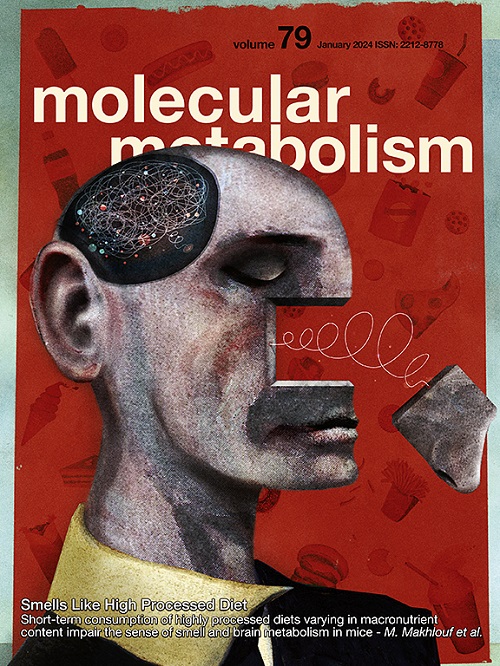Essential role of germ cell glycerol-3-phosphate phosphatase for sperm health, oxidative stress control and male fertility in mice
IF 7
2区 医学
Q1 ENDOCRINOLOGY & METABOLISM
引用次数: 0
Abstract
Objectives
Obesity, diabetes and high-calorie diets are associated with defective sperm function and lowered male fertility. Mature spermatozoa primarily use fructose and glucose, and glucose and glycerol metabolism are important for sperm function. We recently discovered a novel mammalian enzyme, glycerol-3-phosphate (Gro3P) phosphatase (G3PP), and showed that it operates the glycerol shunt by hydrolyzing Gro3P to glycerol, and regulates glucose, lipid and energy metabolism in pancreatic β-cells and liver. We now observed that G3PP expression is the highest in the testis and spermatozoa, and investigated its role in male fertility.
Methods
We examined G3PP expression during spermatogenesis in mouse and assessed male fertility and spermatozoon function in conditional germ cell specific G3PP-KO (cG3PP-KO) mice and tamoxifen-inducible conditional germ cell G3PP-KO (icG3PP-KO) mice. We also determined the structural and metabolic parameters and oxidative stress in the spermatozoa from icG3PP-KO and control mice.
Results
G3PP expression in mouse spermatocytes and spermatids markedly increases during spermatogenesis. Male cG3PP-KO mice, in which germ cell G3PP is deleted from embryonic stage, are infertile due to dysfunctional sperm with reduced motility and capacitation, and elevated spontaneous acrosomal reaction and oxidative stress. However, icG3PP-KO male mice do not have altered fertility, due to the presence of ∼10% normal spermatozoa. icG3PP-KO spermatozoa display significantly reduced functionality and morphological and ultrastructural alterations. The icG3PP-KO spermatozoa show reduced glycerol production, elevated levels of Gro3P and reactive oxygen species (ROS), and oxidative stress that is associated with increased mitochondrial membrane potential.
Conclusions
Germ cell G3PP deletion leads to the generation of spermatozoa that are functionally and structurally abnormal, likely due to the build-up of Gro3P that increases mitochondrial membrane potential, ROS, and oxidative stress and alters spermatozoa function. Overall, the results indicate that G3PP and the glycerol shunt are essential for normal spermatozoa function and male fertility.
生殖细胞甘油-3-磷酸磷酸酶对小鼠精子健康、氧化应激控制和雄性生育能力的重要作用
目的:肥胖、糖尿病和高热量饮食与精子功能缺陷和男性生育能力降低有关。成熟精子主要利用果糖和葡萄糖,葡萄糖和甘油代谢对精子功能非常重要。我们最近发现了一种新型哺乳动物酶--甘油-3-磷酸(Gro3P)磷酸酶(G3PP),并证明它通过将Gro3P水解为甘油来实现甘油分流,并调节胰腺β细胞和肝脏中的葡萄糖、脂质和能量代谢。现在,我们观察到 G3PP 在睾丸和精子中的表达量最高,并研究了它在男性生育中的作用:我们检测了小鼠精子发生过程中 G3PP 的表达,并评估了条件性生殖细胞特异性 G3PP-KO (cG3PP-KO)小鼠和他莫昔芬诱导的条件性生殖细胞 G3PP-KO (icG3PP-KO)小鼠的雄性生育能力和精子功能。我们还测定了icG3PP-KO和对照组小鼠精子的结构和代谢参数以及氧化应激:结果:在精子发生过程中,G3PP在小鼠精母细胞和精子中的表达明显增加。雄性 cG3PP-KO 小鼠的生殖细胞 G3PP 从胚胎阶段就被删除,由于精子功能障碍、运动能力和获能能力下降、自发顶体反应和氧化应激升高,导致不育。然而,icG3PP-KO 雄性小鼠由于存在 10%的正常精子,其生育能力并没有改变。icG3PP-KO精子的甘油生成减少,Gro3P和活性氧(ROS)水平升高,氧化应激与线粒体膜电位升高有关:结论:生殖细胞 G3PP 基因缺失会导致生成功能和结构异常的精子,这可能是由于 Gro3P 的积累增加了线粒体膜电位、ROS 和氧化应激,并改变了精子的功能。总之,研究结果表明,G3PP 和甘油分流对精子的正常功能和男性生育能力至关重要。
本文章由计算机程序翻译,如有差异,请以英文原文为准。
求助全文
约1分钟内获得全文
求助全文
来源期刊

Molecular Metabolism
ENDOCRINOLOGY & METABOLISM-
CiteScore
14.50
自引率
2.50%
发文量
219
审稿时长
43 days
期刊介绍:
Molecular Metabolism is a leading journal dedicated to sharing groundbreaking discoveries in the field of energy homeostasis and the underlying factors of metabolic disorders. These disorders include obesity, diabetes, cardiovascular disease, and cancer. Our journal focuses on publishing research driven by hypotheses and conducted to the highest standards, aiming to provide a mechanistic understanding of energy homeostasis-related behavior, physiology, and dysfunction.
We promote interdisciplinary science, covering a broad range of approaches from molecules to humans throughout the lifespan. Our goal is to contribute to transformative research in metabolism, which has the potential to revolutionize the field. By enabling progress in the prognosis, prevention, and ultimately the cure of metabolic disorders and their long-term complications, our journal seeks to better the future of health and well-being.
 求助内容:
求助内容: 应助结果提醒方式:
应助结果提醒方式:


